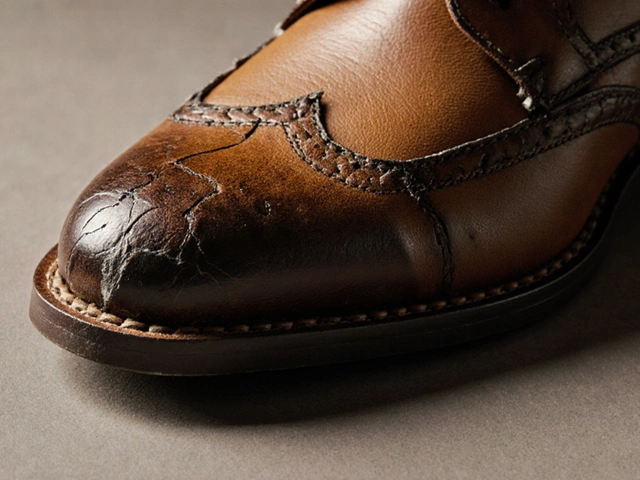Should Employers Pay for Work Shoes? UK Laws, Rights and Real-World Scenarios

- Cleo Fairchild
- 28 July 2025
- 0 Comments
Picture this: you've just landed a new warehouse job, and before your first shift, the manager hands you a list. High-vis jacket, check. Safety helmet, check. Steel-toe boots... wait, do you fork out for those yourself, or is your employer supposed to cover them? It's a pretty common scenario. People rarely talk about it until they're standing in a shoe shop, wallet in hand, wondering who should be picking up the tab.
What UK Law Actually Says About Employers Paying for Work Shoes
If there's one thing that raises eyebrows in workplace group chats, it's who pays for all the kit you’re required to wear. And in the UK, it’s pretty clear-cut when it comes to work shoes that count as Personal Protective Equipment (PPE). The Health and Safety at Work Act, and especially The Personal Protective Equipment at Work Regulations 1992 (updated 2022), says employers have to provide PPE—like safety boots—free of charge whenever the job risks your health or safety. That means if you’d be in danger without steel toe caps, non-slip soles, or anti-static protection, your boss must provide (and pay for) them. No ifs, no buts.
I’m not making this up, either. The Health and Safety Executive (HSE), the UK’s top watchdog on workplace safety, is crystal clear: employers can’t pass PPE costs onto employees. Any boss still trying to deduct money or telling you to “just buy any old thing and bring in the receipt,” is not following the law. This isn’t just for factory and warehouse jobs, by the way. If you work in a kitchen where anti-slip shoes are vital, or on a building site, or anywhere your safety is at risk, the rule stands.
There are a few exceptions, but they’re niche. For example, if you want special shoes for style or comfort when there’s already a basic option provided, then the employer does not have to cover those. But if the shoes are needed for your safety and required for the job, it’s their bill. It’s not about “looking good”—it’s about protecting your toes, your falls, your health.
So, what about jobs with uniform policies, but no real risk—retail, hospitality, bar work? If a uniform is required but doesn’t technically count as PPE, then the law is less clear. Employers can ask you to buy, say, plain black shoes as part of a dress code. The key question is: would NOT wearing those shoes put your health or safety at risk? If yes, the employer pays. If it’s just for a “look,” you might be footing the bill.
Real-Life Scenarios: What Happens When You Need Work Shoes?
Let’s look at the nitty-gritty, because theory is great, but reality is messier. Here’s the sort of tales people swap in the smoking area or over lunch—situations where the rules get stress-tested. Last year, a Bristol delivery driver (who dropped my groceries and stayed for a chat with my dog Luna) told me his company tried to deduct £35 from their payslips for “company approved” safety boots. A bunch of them grumbled, did some Googling, and found the HSE guidelines, then pushed back. The result? Company policy changed overnight, boots handed out free. It took a little nerve, but it worked.
There are other stories, too. A nurse at Southmead Hospital told me (over a well-deserved coffee) that nurses have to wear specific non-slip shoes, but up until a few years ago, they used to buy their own. After a staff survey flagged this as unfair (since slips can actually land you in A&E), management agreed to reimburse for a set list of shoes. It’s not glamorous footwear, but it’s free, and nobody’s risking a fall.
But not everyone knows the rules or feels comfortable speaking out. A friend in retail ended up shelling out £50 for black brogues that matched “the brand’s image.” Because the shoes were nothing to do with safety—just a style choice—the company walked the legal tightrope and won. Those situations are unfair but legal... unless you can prove the shoes are necessary for your health.
The lesson? Ask questions. Don’t be shy. Write down what you’re told and keep receipts. If you aren’t sure the shoes are essential PPE or just part of the dress code, ask HR. Most companies will cave if you quote the right law and back it up with printed evidence from the HSE website or Citizens Advice.

Practical Steps: What To Do If Your Employer Refuses to Pay
If you think you’re getting short-changed, don’t panic. First, check exactly what the job requires. Is your safety at risk without specialist shoes? Will the role put you in contact with hazardous substances, heavy objects, slippery surfaces, or electricity? If yes, you’re probably owed proper work shoes for free.
Start by reaching out to your line manager, union rep, or HR. It’s totally fine to write something like, “Am I entitled to PPE-provided work shoes under current UK regulations?” Be polite—but confident. Attach a screenshot or link to the exact bit of the regulation.
If the conversation goes south, try Citizens Advice or your trade union if you have one. The HSE itself welcomes tip-offs about employers dodging their PPE obligations—they’ve been known to investigate, and companies who flout the rules risk fines up to £20,000 (yes, that happens!).
What about receipts? Always keep them. If you’ve already paid out, you may be able to claim the money back once you prove the shoes were for health and safety and there was no alternative offered.
Here’s a handy list of steps if you get stonewalled:
- Document everything—including emails, texts, or notices where you were told to buy your own shoes.
- Download or print the HSE’s PPE guidance for employees.
- Check your employment contract for any mention of uniform or PPE.
- Approach HR with a written query, backing up your case with the law.
- If you’re not happy with their response, contact Citizens Advice or your nearest ACAS office—they’re both free, confidential, and know their onions.
- Still unresolved? Reporting to the HSE is your next step.
Remember, if you’re required to wear something for your safety, your boss must pay any related costs, including cleaning and maintenance. If you only need smart shoes because the shop’s dress code says so, odds are you’ll need to buy them yourself (though bigger chains sometimes provide allowances—worth asking about).
The True Cost and Impact of Work Shoes: Numbers & Human Stories
Let’s talk numbers and feet—because those work shoes add up, especially at the start of a job. According to a 2023 survey by the British Safety Industry Federation (BSIF), one in four UK employees in at-risk jobs spent over £40 of their own money on work-related footwear last year. And for apprentices or entry-level workers, that sum is a real punch to the bank account.
It’s not just the sticker price, either. On average, a good pair of steel-toe boots lasts about 18 months for warehouse staff, but kitchen workers can burn through two pairs of slip-resistant shoes every year. Replace those yourself, and you’re soon looking at triple-digit annual spending. And with the cost of living bites we’ve all felt lately, every pound really does count.
Employers don’t always see the consequences until workers get fed up. There’s decent research showing that providing free, proper-fitting shoes actually cuts accidents—and the cost to the company—dramatically. The HSE’s own data shows workplaces with strict PPE policies see 40% fewer foot injuries.
If you’re curious about how the costs, rules, and policies stack up in real life, check out this quick table:
| Industry | Typical Work Shoe | Employer Pays? | Average Pair Cost (GBP) |
|---|---|---|---|
| Warehouse/Manufacturing | Steel-toe, anti-slip boots | Yes (PPE required) | £45–£90 |
| Construction | Steel-toe, puncture-resistant | Yes (PPE required) | £50–£120 |
| Hospitality/Kitchens | Slip-resistant shoes | Usually Yes | £30–£70 |
| Retail (non-safety) | Plain, smart shoes | No (if not PPE) | £28–£65 |
| Healthcare | Supportive, anti-slip | Often Yes | £35–£80 |
Here’s the bottom line nobody tells you in a job advert: If your feet are expected to keep you safe, your boss pays the bill. Don’t just accept “That’s how it’s always been”—the law’s on your side, even if the work policy takes a little nudging. Next time you lace up for a shift, know your rights and, if you need to, stand up for your toes. Luna the dog would definitely want you walking happy and safe.


